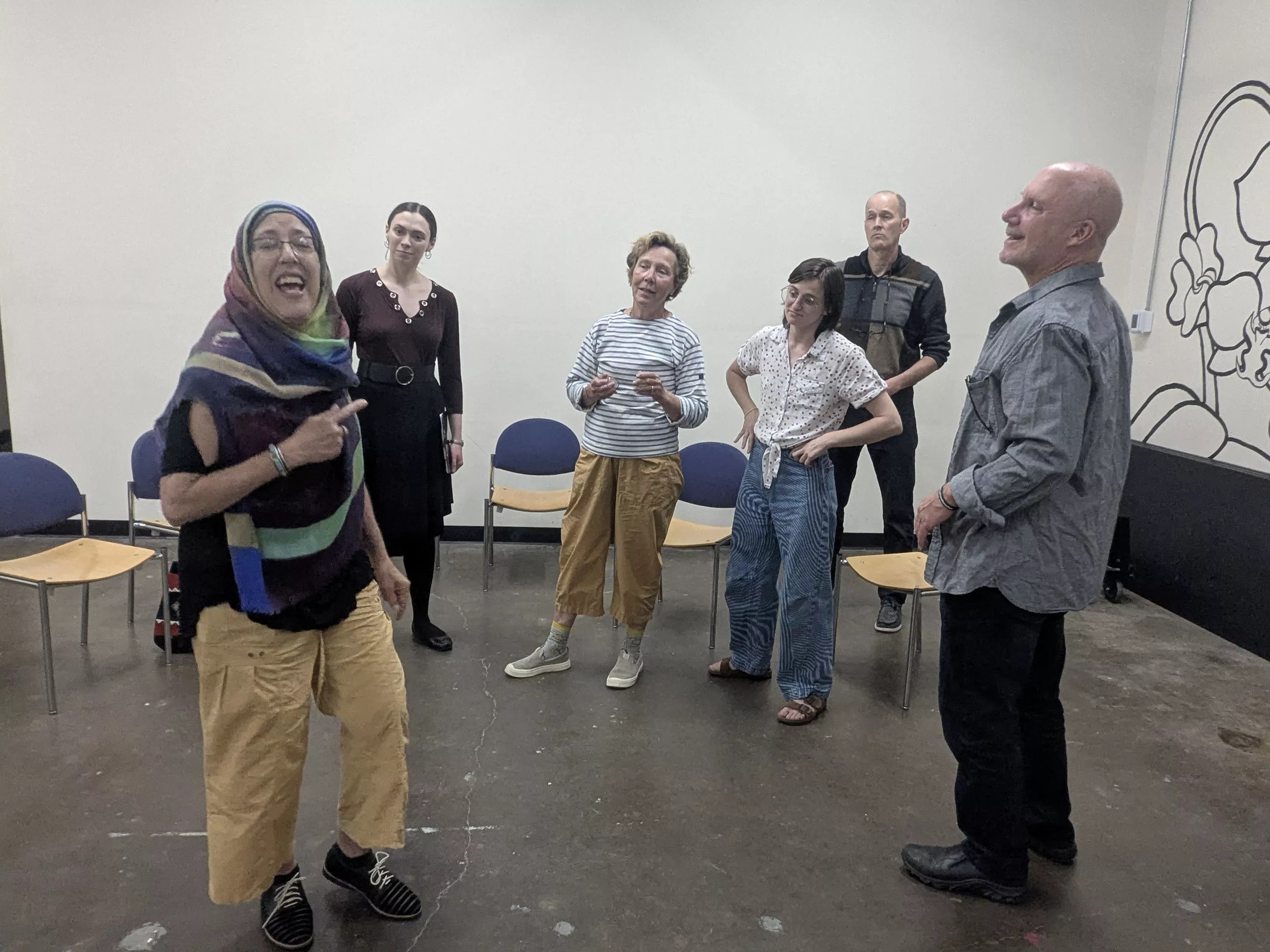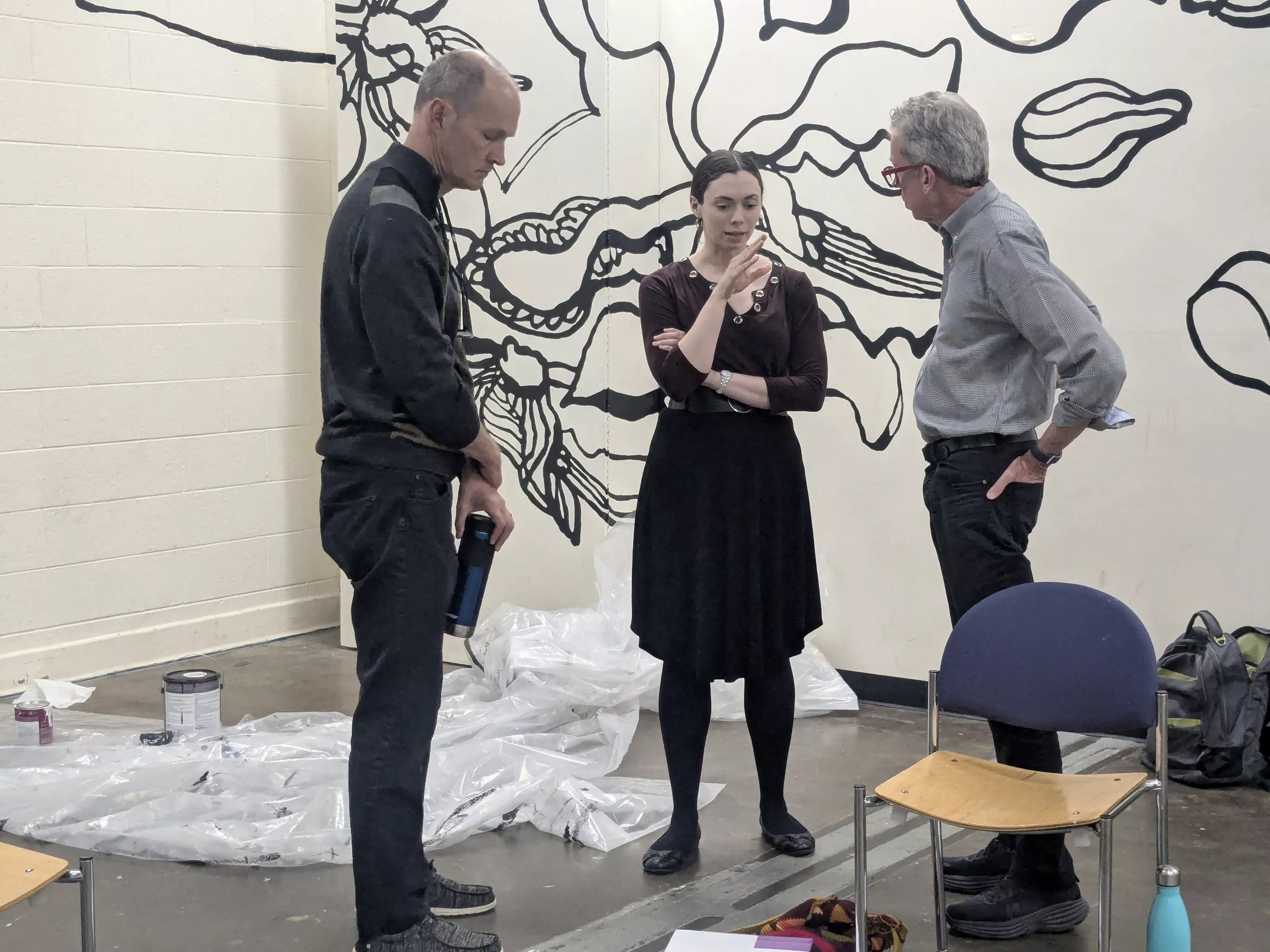
Courtesy of The Conversation

Audio By Carbonatix
In a time of polarization and unrest, a new project is asking audiences to do the hardest thing of all: talk.
“The temptation is to not talk about difficult things or to do it politely, but we really have to learn how to be able to talk about shit so that can move forward,” says playwright Ami Dayan. “It’s important to understand the other side as human beings rather than as animals, or whatever. The political sphere is so diverse and antagonistic. There’s got to be a way for us to go, ‘Oh, this is why this is so important to you.’ Then we can address both of our concerns, and we can create a more reasonable world for future generations.”
That conviction forms the backbone of The Conversation, a bold new theatrical series that confronts some of today’s most divisive issues through live performance and community dialogue, beginning with The Israeli-Palestinian Conversation. The show premiered in May at Boulder’s Dairy Arts Center and is back by popular demand after a sold-out run, this time at Buntport Theater in Denver from September 4 through 21. The show is co-presented by J Street, The Center for Humanities & the Arts, The Rocky Mountain Peace and Justice Center, and the Colorado Friends of Standing Together.
“I am Israeli, so I care deeply about what’s going on there,” Dayan says. “After October 7 happened, I had to do something, so I put together a piece of an event called Standing for Humanity in Gaza and Israel across Colorado. We did readings and a panel discussion with people speaking from both sides and from the middle. A lot of audience members told us that this felt like the only platform that really allowed for a real discussion.”
The piece addresses the ongoing humanitarian crisis in Gaza, Israeli hostages who are still held captive and generations of violence, displacement and deep-rooted fear that underpin the current situation. It’s a raw, emotionally charged invitation to consider whether we want to be “right” in endless arguments or “effective” in finding a way forward, Dayan says.
The structure is unusual for theater: part play, part public forum. Audiences are welcomed into a simulated community event led by actor-facilitators, portrayed by ensemble members like Elise Collins, who says she feels “a profound responsibility to hold the subject with dignity and grace in a way that helps people empathize with each other rather than further divide us.”
The evening includes dramatic excerpts, interactive audience questions and reflections on works like How to Remain a Humanist After a Massacre in 17 Steps and the Palestinian poem “Write My Name.” Audience members are invited to raise their hands, speak and engage, though director Bud Coleman emphasizes participation is voluntary and carefully structured.
“One of the guiding principles that Ami and I had going into this was to respect the audience,” Coleman says. “We’re never going to put them in the position where an individual is singled out, because people are going to be coming in with everything from zero to 100 percent of what their degree of comfort is being a participant. We have created a structure where people can participate at whatever level is comfortable for them.”
Behind the scenes, the work has been anything but easy. Dayan, who previously directed Masked about three Palestinian brothers Off-Broadway, began developing The Conversation in early 2024 after staging a series of public readings and community panels in response to the events of October 7.
“I find it hard to sit on the sidelines and not do something,” Dayan says. “And I don’t mean that what I’m doing is going to solve anything. It’s not. But my energies are going somewhere, and it seems like there’s a community here that’s trying to be more vocal, so I’m leaning into that. People are trying to encourage our local governments to call for an immediate ceasefire and delivery of humanitarian aid. It’s necessary beyond necessary and the reason why we do this work.”
That urgency approach shaped the collaborative nature of the script. Palestinian-American activist Sergio Atallah has been involved from the first draft, contributing key sections representing the Palestinian perspective. The character of Reema, played by Palestinian actor Julia Halaby, is inspired by Dr. Reema Wahdan, a local leader who has worked to combat anti-Muslim hate and preserve Palestinian narratives.

Director Bud Coleman talks with two actors as they rehearse for The Conversation Part 1: The Israeli-Palestinian Conversation.
Courtesy of The Conversation
“This production feels weighted and purposeful,” Halaby says. “I’m also shuddering at the weight of the piece because I don’t want to mess it up; I want to do it justice. I don’t want to be heard. I want that story heard and I want people to understand the level at which we as a people are inextricably entwined.”
Dayan acknowledges the political heat surrounding the topic – particularly within Jewish communities, where generational divides have made conversation at family tables difficult, let alone onstage. “The whole ‘us or them’ conundrum is where everything falls apart,” Dayan says. “There is no ‘us’ without ‘them.'”
To that end, The Conversation leans into discomfort. The script incorporates conflicting perspectives, even extreme ones, in the hope that seeing them play out can model ways of listening and grappling with what feels unbearable. The project is being produced in collaboration with the Center for Humanities & the Arts, where Dayan serves on the community advisory board. The center’s “Difficult Dialogues” programming inspired the format, though Dayan says this new theatrical approach pushes those conversations further.
The production is deliberately minimal: six chairs, two stools and projected questions. But its message is immediate and responsive, with the team making ongoing changes to reflect unfolding headlines.
“There have been multiple times when we’re like, ‘Oh, we have to add something new because something has happened in the news,'” Collins says. “It’s been incredibly collaborative.”
Future installments in the series will tackle topics including abortion, immigration and the emotional toll of politics. Dayan hopes the model can expand to address other divisive subjects like gender identity and school shootings.
“It is a play hidden within a community event,” Dayan says. “The hope is that this form can be utilized to talk about anything that comes up. School shootings, gender issues or anything that comes up in our lives and is heavily charged. I’m seeing this basically as a family of actors that become more and more familiar with this form.”
At its heart, though, The Conversation isn’t just about structure or format. It’s about facing the uncomfortable present with honesty. As one monologue from the play puts it:
“Everyone is right and everyone is certainly wrong, and who cares if it started in ’73, ’67, ’48, ’29 or fucking Genesis? People are suffering now. There is no, there was no and there will be no ultimate justice. There are historical developments, with no magic buttons to ‘undo’ them. If dialogue can lead anywhere, it is only on the basis of a shared – selfish – desire to create a better reality for future generations.”
The Israeli-Palestinian Conversation is back for a second run from September 4-21 at Buntport Theater, 717 Lipan Street. Tickets are $35.